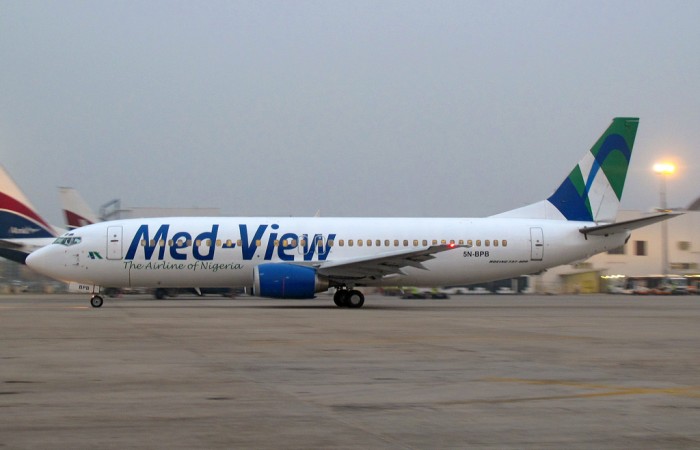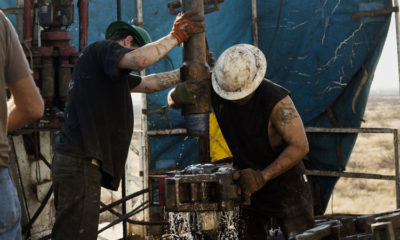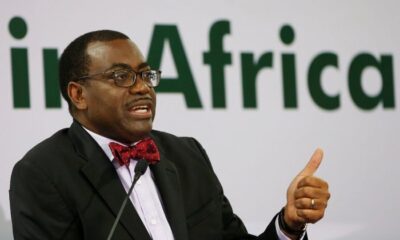Business
Some Airlines Cut Corners, Divert Revenue – Bankole
Published
8 years agoon

Mr. Muneer Bankole is the Chief Executive Officer of Med-View Airline. He spoke with MAUREEN IHUA-MADUENYI on airline business and the tough challenges in the nation’s aviation industry
A lot has been said about the aviation industry concerning its challenges and potential. What has been your experience as an investor?
It has not been easy looking at so many variables that go along with our country. The economic situation is the first; foreign exchange is the second; and the third has to do with the aviation fuel and the marketers’ situation. Others are our demand for equipment; the maintenance; spare parts and so on. This is a very difficult period in the aviation industry.
We buy dollars from the parallel market and when the currency went as far as N500 to N520, we didn’t know where we were going. We went further ahead to ask the government to give us a window after agriculture and the government was kind enough to provide that platform for airlines where some of us got the relief to meet our international obligations because some of our aircraft are leased and we owe the duty to pay our lease rentals.
The major one we are now talking to them about is the fuel situation; and we have a meeting with the Minister of State for Petroleum, Dr. Ibe Kachikwu, to talk about Jet A1. Since the marketers are benefitting, they should bring down the price. They need to talk to them or give airlines through the membership of Airline Operators of Nigeria the window to work with any marketer of our choice among the major ones, directly. Some of them will be more serious on that level.
Have the challenges always been there or were they caused by the current economic downturn?
You know before this government came in, we were talking about N150 to $1. So, it has escalated the whole problem. We were selling ticket at N16,000; we went as far as N45,000 because of all these problems in the economy. But how many Nigerians have the money to fly? That is also a challenge; the whole thing started that way and continues to grow. And the fastest and safest means of transportation, which anyone cannot contest, is by air. It takes one hour to get to Kaduna; 55 minutes to Abuja; 1hr.15 minutes to get to Kano; and one hour 35 minutes to get to Yola; but if you go by road, you will understand that there are more hazards.
Operators also talk about multiple charges as a major challenge but the regulator, the Nigerian Civil Aviation Authority, thinks that the reason why domestic airlines die is because most of them lack proper corporate governance. What is your view on this?
To be honest with you, we had a beautiful meeting with the NCAA. We have also had a meeting with the Federal Airports Authority of Nigeria. The situation is different from what you just said. First, the airline is committed to the agreement that you collect the Ticket Service Charge on behalf of the agency that has five per cent on the ticket.
Unfortunately, some of us don’t remit the money as and when due. The NCAA should device another channel to collect the money rather than use a third party. It needs to work out the modality with the airlines to come out with a fixed rate. We have told them the Nigerian Airspace Management Agency, for instance, that it should not expect us to pay navigational fees in dollars.
So, some of these things we have discussed brought about our going to the Senate. The Senate set up a committee and the Federal Government is resolving the issue now. Some of these charges need to be fused together or harmonised because that is one of the challenges we have been facing. But, as I said, they are listening and we are moving on.
With the challenges, some people have said domestic airlines should look at mergers and acquisitions as a way out. What’s your view on this?
Some of us are already discussing among ourselves that it is the best way rather than just flying empty airplanes; some don’t even have enough. We are looking at how we can pool resources together and make money. I think it is a very wonderful idea.
Away from problems in the industry; what inspired you to go into aviation not just as a professional but also as an investor?
I grew up in the industry. I celebrated my 40th year in the industry this year. I am blessed because I started like a cadet and went through all the units and departments and corridors. I was fortunate to work with the Nigerian Airways. I went to stations and developed myself educationally. As I was moving, I was reading. I never had a dull moment; as I was reading, I was doing business.
I have a passion for this business that I am doing because I grew up in it and I know the safety implication and I ensure that whatever I think is good to do, there is no compromise. We are just getting the delivery of our aircraft from maintenance. It was there for two months; ideally, it should be between two and three weeks but because of the currency issue I mentioned earlier.
But you have to close your eyes to such problems and make sure that what you promise people is what you deliver. Then you will be doing well in the business and you don’t just recklessly spend the money because it is not your money. When a customer buys a ticket to go to London, it is until he goes and comes back that the money belongs to you.
So, these are few things you need; you need to discipline yourself and keep your business in line with what you have promised. Most of our colleagues do a lot of diversion and that will not help the business. Most of them forget the spiritual inclination of life attached to the business. It is something you have to remember; these are souls, we carry human beings.
It is a different business where you load trailers or trains and move the goods, these are souls. What you see every day are humans. Med-View has carried over two million people since inception. On hajj, we have carried over 300, 000 and on international routes, we have carried between 60, 000 to 80, 000. You can see the trend; we are getting this number because of our sincerity, commitment and on-time services. These are the secrets of the game: don’t cut corners; stay and be decisive.
Have you encountered some setbacks and challenges during this past 40 years?
In every business there must be a lot of challenges but you have to hold on to God. He gives you the answer and you move on. If you dwell on the challenges, you will not move on. They are things for you to learn from and move on straight to the point.
If you have a delay to London for instance, what do you do? You will lose money but you put the passengers in a hotel with the knowledge that these customers deserve the service. Tomorrow, they will come back to you. But when they are in that situation and you ignore them, tomorrow don’t expect them to come. That is what makes this company tick; we take service delivery as the key to the success of the business.
A lot of things seem to have improved in the industry in terms of safety. What are stakeholders doing differently from what they did in the past?
First and foremost, let us commend our regulators. There were a lot of things that people took for granted in the past that are now being enforced. Before you bring in an aircraft, the NCAA must go and see the aircraft on site either at the MRO base or inspection base of the airline that owns the aircraft. Then those aircraft on ground; there are inspectors who carry out random checks both on the crew, the aircraft, everything. Maybe in the past they were not provided with all the logistics they needed to move around but today, they are equipped, they go on the ramp and check. NAMA people, all of them, I think are all trying to do it right.
But above all, we thank God for keeping the skies safe. What keeps these airplanes flying? That is the beauty of it all.
Now, safety has improved, but people still complain about delays and outright cancellations of flights. What are operators doing to check these?
Some days ago, we had a flight scheduled for London, the maintenance people who were doing a check on the aircraft discovered certain technical issues and they told us that the aircraft might require a spare part or double check. When we got the information, we tried to get across to the clients by sending text messages.
Customers need to be properly briefed; it is for the safety of every soul. But African people, Nigerian people especially always feel the other way round and we need to educate them. Once you hear anything that has to do with safety, please do not negotiate it; it is for the safety of everyone both the people and the equipment.
Nobody wants to invest money worth about N50m or N70m to kill people with the insurance involved and all. Airlines too must be careful and do the needful. You might say it is not your problem but those customers are your problems. We provided logistics for the London-bound passengers that were delayed; it costs a lot of money but they were comfortable. That is the joy of this business.
There is also the issue of weather. The pilot might want to be guided on the weather issue. It is a challenge to all of us. The other is fuel; we don’t have it, and we are not even producing it in any of our three refineries. We have appealed to the government before to dedicate Kaduna, Port Harcourt or Warri refinery but we are still importing. We are at the mercy of the market which sells at N240. It was N98 before. It is N265 in Yola. Some of us have cancelled flights in Kaduna because of a lot of stress.
Considering that a lot of people cancelled trips to Abuja due to the NAIA closure; how are the airlines coping?
Somehow, we are blessed. We are one of the airlines that have on-time departure. Inflight services are also good from feedback and then safety which we don’t change. Aircraft maintenance too, one of our aircraft went for maintenance recently and it cost $2m; four of that in one year is $8m. Where are we getting the money? It is from customers.
How is your company doing on the NSE where you recently listed?
That is the beauty of doing business. It is good for someone to take a bold step. We have to leave something behind. This company serves as a reference to me and my colleague who is from Saudi Arabia. We cannot continue to be there forever; so we have committed partners and we said, let us get more people to be investors in this company and develop the business of aviation.
The profit margin is not so much but we have something to thank God for that we are creating employment. We have about 400 staff on our payroll and you know what it means to take them out of job. We have created a training school and we are growing some young people irrespective of their discipline at the beginning to see it is good for them to develop their future in this industry.
What do you want the government to do to improve the sector?
We have said many times to them: create an enabling environment. To take a loan today, it is at an interest rate of two digits. In foreign countries, it is about 2.5 per cent but naira starts from 22 to 26 per cent while dollar is about 12 per cent. We would appreciate the government to work on this. Funding is very critical to this industry.
Let the government cut down those unnecessary things. If people have access to funds, the industry will grow.
Is the CEO and Founder of Investors King Limited. He is a seasoned foreign exchange research analyst and a published author on Yahoo Finance, Business Insider, Nasdaq, Entrepreneur.com, Investorplace, and other prominent platforms. With over two decades of experience in global financial markets, Olukoya is well-recognized in the industry.

You may like
-
Nigeria Joins BRICS as Partner Country, Strengthening Global South Cooperation
-
70 Million Poorest of The Poor Nigerians To Get N75,000 From FG
-
Nigeria Surpasses OPEC Quota with 1.51 Million bpd, Targets 2.06 Million in 2025
-
Global Investors Commit $7.6 Billion to Nigeria’s Development at AIF 2024
-
Nigeria-China Trade Strengthened as Grimaldi Introduces Direct Shipping Line
-
Nigeria’s GDP Records 3.46% Growth in Q3 Spurred by Non-Oil Sector













